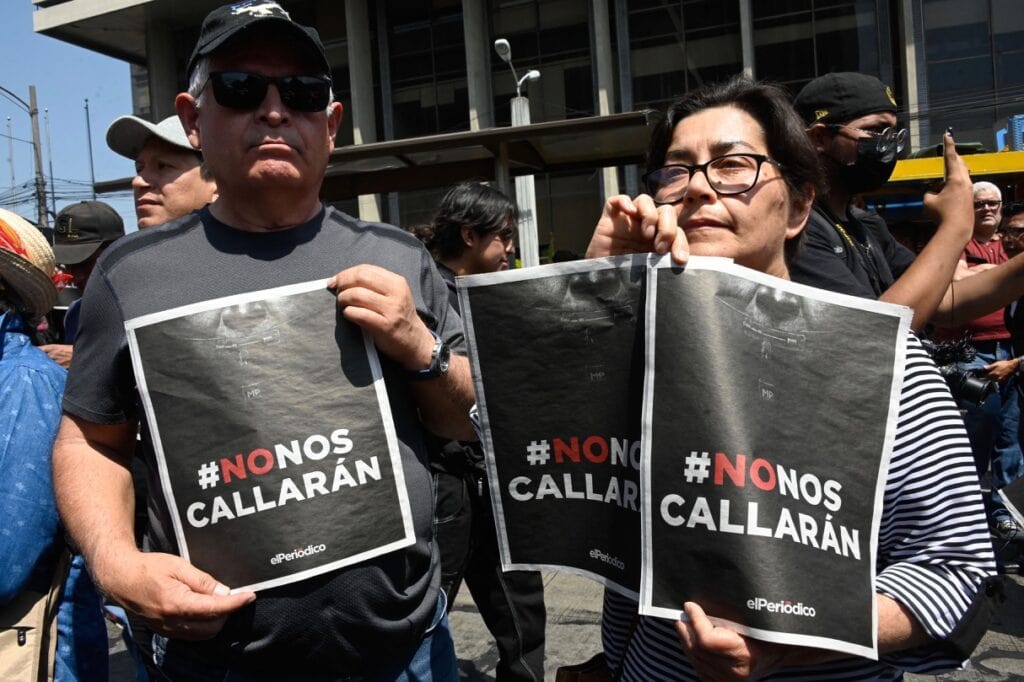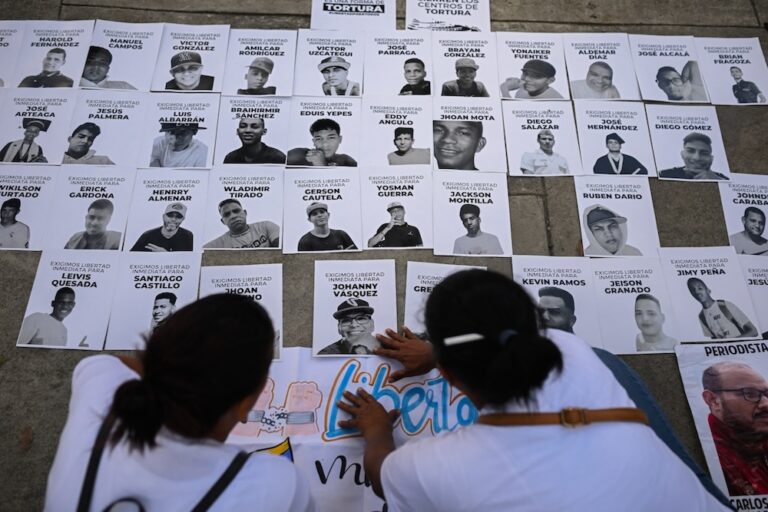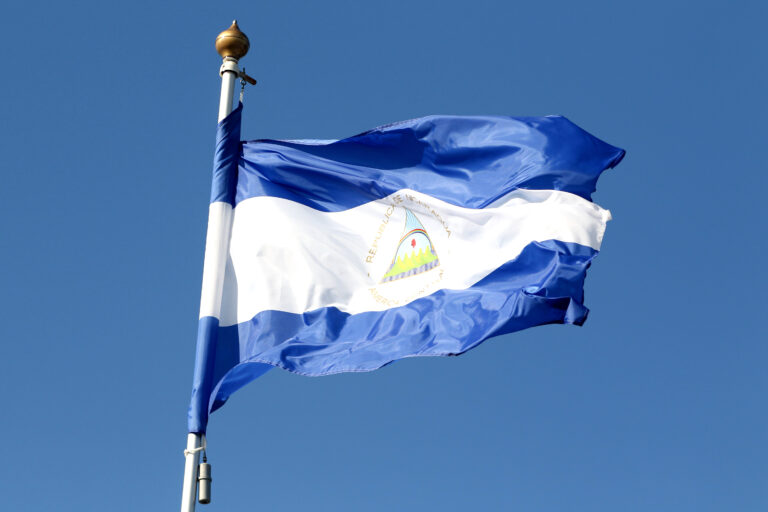May 2023 in the Americas: A free expression roundup produced by IFEX's Regional Editor Laura Vidal, based on IFEX member reports and news from the region.
Violence took three more journalists in the region; Peru approved a bill increasing penalties for defamation and Guatemala’s news outlet elPeriódico was forced to close. Meanwhile, PEN America is responding to the wave of US book bans with a lawsuit in Florida, and in Colombia the trial against the official allegedly responsible for Jineth Bedoya’s kidnapping kicks off with some dubious testimonies.
Three journalists killed in yet another tragic month for the region
Luis Gabriel Pereira was fatally shot on 12 May in Ciénaga de Oro, Colombia. FLIP has called for further investigation to clarify the motive behind the killing and highlighted that Pereira had been working on a series of reports around a femicide case.
In Argentina, the killing of journalist Griselda Blanco was at first categorised as a femicide; however, FOPEA is emphasizing the need for a thorough investigation and drew attention to factors that indicate a possible connection between the murder and her journalistic work.
Mexico suffered another loss with the murder of veteran journalist Marco Aurelio Ramírez Hernández.Ramírez Hernández was chased and shot while driving in Agua Blanca, Tehuacán, Puebla. ARTICLE 19 Mexico and Central America is demanding further investigation and protection for his family and colleagues from the local government.
PEN America challenges book bans in Florida with legal action
Together with publisher Penguin Random House, authors, and parents of affected children, PEN America filed a lawsuit against a Florida school district to respond to sweeping attempts to ban books focused on LGBTQI+ and racism issues. The targeted books have included classics like “The Color Purple” and contemporary works such as Angie Thomas’ “The Hate U Give”.
According to PEN, the school district’s actions not only violate students’ First Amendment rights but also hinder their intellectual and educational growth. The organisation argues that banning these books sends a chilling message that certain ideas and narratives are not allowed, thereby impeding critical thinking and depriving students of exposure to different viewpoints.
PEN also asserts that the school district’s actions disproportionately impact marginalised communities, as these books often address issues and experiences that are particularly relevant to them.
The organisation argues that rather than shielding students from challenging or uncomfortable topics, schools should provide opportunities for discussion and critical thinking. According to Nihar Malaviya, CEO of Penguin Random House: “Books have the capacity to change lives for the better, and students in particular deserve equitable access to a wide range of perspectives. Censorship, in the form of book bans like those enacted by Escambia County, are a direct threat to democracy and our constitutional rights.”
Also, according to author Ta-Nehisi Coates (in an interview with PEN) :
“They are trying to counter the act of reimagining. That’s what this war is over.”
Peruvian Congress passes bill to stifle criticism
In a concerning turn of events, on 4 May – the day after World Press Freedom Day – the Peruvian Congress approved a bill to raise penalties for defamation and slander offenses. The legislation aims to address issues related to one’s reputation, raising concerns about potential infringements on freedom of expression. Stricter penalties could be misused as a means to suppress dissenting voices and to intimidate journalists, leading to self-censorship in an already diminished press landscape.
According to Peru’s Institute of Press and Society (IPYS), “[t]his decision goes against the criteria established by the Inter-American Court of Human Rights regarding the incompatibility of sanctioning speeches targeting public officials as a crime with freedom of expression.” They highlight that “[i]t is clearly an intimidation tactic against the press, which has reported on a series of irregularities committed by politicians represented in Congress and the congressmen themselves.”
This move is all the more worrying given the tendency of Peruvian public authorities to use legal means to silence the work of journalists who may prove “bothersome”. Recently, Judge Miguel Ángel Dueñas Arce requested an extension of a legal defamation lawsuit against journalist Olga Minaya Oroya, seeking a prison sentence of one year and 8 months; earlier in May, the Supreme Court of Justice issued a resolution stipulating that the trial against journalist Daniel Yovera, who was accused of defamation, will continue until 23 June, despite two instances of the Judiciary declaring the process expired last year.
IPYS has issued an open letter to Congress, calling on national representatives to reject the proposed law, highlighting their concerns about these measures in a country where nearly 150 journalists have faced legal action in the past five years due to their journalistic work.
Guatemala’s media freedom plunges with closing of elPeriódico
Guatemala’s media landscape suffered a significant blow in May as the country’s leading daily newspaper ceased operations following relentless government pressure. The newspaper, known for its critical and investigative journalism, has been targeted by the government in a series of legal proceedings. The trial against the newspaper’s owners, particularly its founder José Rubén Zamora, has been widely regarded as a tactic to silence dissenting voices and curtail freedom of the press. As Reporters Without Borders notes:
“The real target of ‘El Periódico’ owner José Rubén Zamora’s trial is independent journalism and the more than 150 reports that his newspaper has published about government corruption in Guatemala.”
The outlet had already laid off 80% of its staff and stopped its print edition in November.
In what became his final column in elPeriódico, Zamora reflected upon three decades characterised by an unwavering battle against corruption, impunity, and the illicit drug trade: “The simple fact of doing journalism, investigating and denouncing corruption should not be criminalised. 166 exceptional professionals have lost their jobs, and Guatemalans lose an important source of information.”
Mission to Guatemala
Together with other organisations from across the region, IFEX-ALC supported an observation mission to Guatemala to analyse the state of press freedom in the country. In a joint statement they highlighted how journalists frequently opt to remain anonymous when publishing their columns or articles, driven by concerns over potential retaliation.
Journalists also face specific acts of retaliation, particularly when summoned to provide testimony and expose their confidential sources, even finding themselves treated as accused parties in high-profile legal proceedings. At the same time, more than 20 journalists have fled the nation due to threats and criminal accusations stemming from their coverage of influential figures. Surveillance and death threats, occasionally emanating from political contenders, loom over certain journalists, intensifying the climate of intimidation.
The mission’s conclusions proved to be alarming “not only for the right of journalists and communicators to inform the public, but for the essential right of citizens to receive this information in order to make their own free and conscious decisions.”
“In light of this grave scenario, the mission has concluded that without a free and independent press there can be no free and fair elections, and without free and fair elections there can be no true democracy.”
Colombia: Trial milestone in kidnapping of journalist Jineth Bedoya
After 23 years of the relentless pursuit of justice, a former prison guard is finally facing trial in connection with the high-profile kidnapping of Colombian journalist Jineth Bedoya Lima. The trial marks a significant milestone in the long-standing quest to hold public officials accountable for crimes committed against journalists.
Bedoya Lima was abducted and violently assaulted in 2000 while reporting on La Modelo prison and its well known cases of violence. The trial now underway involves Marco Javier Morantes Pico, a former prison guard who allegedly participated in the planning and execution of her kidnapping.
The trial has garnered significant attention within Colombia and internationally, underscoring the broader struggle for press freedom and the protection of women journalists’ rights.
At the time of the attack, Morantes was working as a junior guard at the prison entrance. He is accused of the crime of kidnapping and participating in the plan to “abduct someone who had addressed topics involving groups or paramilitaries, such as the arms trade inside [the prison] and their use in the various massacres that had occurred within the prison facility.”
At the hearing, Morantes, who continues to work at the National Institute of Penitentiary and Prison Studies, pled not guilty. He declared that he did not have full knowledge of the functioning of the prison complex – nor any specific training to work inside it – and that he did not recall if any vehicles entered the prison the day of the kidnapping. Meanwhile, Reinaldo Fierro, who was the director of La Modelo at the time of Bedoya’s kidnapping, denied any knowledge of what happened within the complex.
As a response, Bedoya stated on Twitter:
What is happening right now in the trial of one of the officials from [INPEC] regarding my case is mind-boggling. All the state agents seem to have collectively developed amnesia and don’t even remember how the Bogotá Model Prison was guarded. #Impunity
This trial underscores the importance of holding public officials responsible for their actions.
It is also a powerful demonstration of the potential for justice – even in cases that have long been marred by impunity – and how that sustained struggle for accountability can also change the narrative and bring about change. The process in the case of Jineth Bedoya, in spite of the many challenges it has faced, has the potential to contribute to greater security for all journalists, particularly women who face sexual violence, and support them in their work shedding light on critical issues.
In brief
- Salman Rushdie was honoured with the Centenary Courage Award at a PEN America literary gala, marking his return after a knife attack. “The struggle goes on”
- Global Voices Advox has released an ‘Unfreedom Monitor‘ report on Ecuador and El Salvador.
- Cuba introduces new law to regulate media, sparking concerns.



